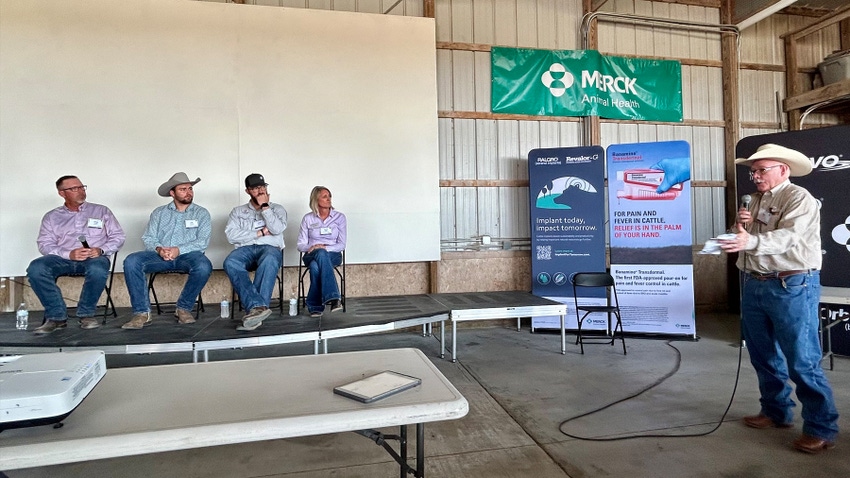
It takes many hands to bring food, fiber and fuel to Americans every day. However, more than 60% of all agribusinesses deal with some degree of labor shortages, according to research from Kansas State University.
From feedlots to farms and every agribusiness in between, employers are in a real pinch to find those hands that feed the world. The 2023 K-State Beef Stocker Field Day featured a panel of agricultural employers and experts to discuss the situation. The panel, moderated by Wes Ishmael of Hereford World, included:
Chad Cargill, of Cargill Ranch, Isabel, Kan.
J.D. Powell, Sandhills Hay Co. Ltd., Parks, Neb.
Keith Bryant, Cobalt Cattle Co., Garden City, Kan.
Karol Fike, professor in animal science at Kansas State University
Starting with recruitment and retention, the panelists agreed it’s a struggle just to get the right candidates in the door who have a willingness to work in agriculture when so many other businesses compete for their labor with higher paychecks.
Cargill said it once was a situation where you could get someone who would look at a job working on a ranch as a career, but now young people aren’t filling in those vacancies left by retiring workers.
Each panelist had a different perspective on the H-2A visa program and immigrant labor. For some, the paperwork hassles were too much to overcome, while others found a successful solution.
“On our apiary side, the majority of our employees are H-2A workers, and we’ve gone over 10 years with the program,” Powell said.
Even with a good benefits package and competitive pay, Sandhills Hay wasn’t getting enough domestic workers to apply. Powell cautioned, though, that getting started in using the H-2A program is expensive and filled with red tape and paperwork.
But agricultural labor isn’t just about a warm body in a tractor seat. Today’s jobs require hands-on technical skills and knowledge. And that means major time and money is invested in training new hires.
“Not everyone grows up like a lot of us in this room today,” Bryant said in regard to living on a farm. “And so, we’ve had to put a lot more focus on how we onboard those employees — the amount of time we spent training and developing them. And we’re doing a lot more of that now than we were when I first started in this business.”
Employee of today
Fike said with her experience in advising and mentoring students at the university level, she’s seen fewer students coming from agricultural backgrounds. That means, employers need to adjust their expectations.
“There’s a desire and the interest to learn, but they’re starting at a different level than you might expect,” she said. That’s why internships on agricultural operations are a critical part of the education process today, to offer that mentoring and training to get these young people to a place where they can be successful in the agricultural field, she said.
Fike advised that today’s young people are more mission- and purpose-driven than previous generations, meaning that if they believe in the cause, they will work harder.
“It’s not just about the dollar; it’s about how can I make a difference, and where can I make a difference with my skills and the work that I do,” Fike said. “They value that mentorship and the feedback on a regular basis.”
The panel offered this advice:
Internships. They are helpful, but only if you’re prepared to invest time in training and mentorship. They are learning, Fike said, so be prepared to answer questions and teach.
Personality. These traits matter in the workforce. The best employees are coachable and ready to learn, Bryant said.
Onboarding process. It takes time and money to recruit and interview candidates, Powell said. But if you don’t have the right onboarding process, you risk that new employee quitting and putting you at square one all over again. “Taking that new guy and showing them directly what you expect them to do has saved us in damaged equipment costs,” he said.
You can watch the panel discussion in its entirety below:
Study: Filling ag jobs would boost state economy
According to the study, “Help Wanted: How Agricultural Labor Shortages Affect the Kansas Economy,” the state could add more than 39,000 jobs to the economy, generating $2 billion to $6 billion in additional economic output in the directly affected ag sector, if the labor shortage was filled.
The study, led by Jennifer Ifft, K-State Extension specialist in agricultural policy, also found:
Including direct, indirect and induced effects to the Kansas economy, labor shortages represent a loss of an additional $4.1 billion to $11.7 billion in additional output.
Annual average gross pay has risen 5% across the sector, which is still not enough to compete with other industries for labor.
Labor shortages emerged well before the pandemic. In 2018, there were 80,000 job openings across Kansas, with about 55,000 unemployed individuals.
For more on the research, you can read the study online.
Read more about:
LaborAbout the Author(s)
You May Also Like






